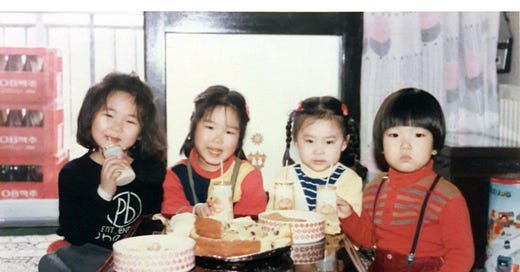Content warning: depression, suicidal thoughts
My 3rd birthday party. Can you find me? (Answer is at the bottom.)
This week, I turn 39. I remember the month leading up to my 30th birthday. I was panicking about getting old: I won’t be in the 20s any longer! All those worries have now dissolved. Out of all the years that I have lived so far, the ones in my 30s have been the best. I am more aware of myself and have the strength to set my own goals instead of blindly pursuing what society presents to me. The relationships I have built with my partner and friends nurture me on a daily basis, and they love me for who I am: an animal-loving often-emotional quasi-Korean super-nerdy queer human. (If you have other descriptors, comment below.)
When I was younger, a birthday was an excellent excuse to have fun with friends. It often involved delicious food and drinks. As I have developed and suffered from depression over the last 15 years, a birthday has become more significant. Each one marks another year that I am still alive. On a “good” day, it is easy to fill the day with fulfilling tasks and joyful activities. However, on a “bad” day, it can be hard to pass one hour while I strongly desires to stop existing. That is the more accurate description for my suicidal thoughts: not “wanting to die” but rather “wanting to not exist."
On the surface, my desire makes no sense. Despite the systematic oppression that I experience as a queer immigrant woman of color in the United States, I am lucky to live in a relatively-safe bubble filled with a job, shelter, food, supplies, a car, caring people, and access to public services and medical care. However, when depression settles in, all of these become irrelevant. My mind gets fixated on one thing: I am not good enough.
This idea doesn’t make sense, either. I am more than good enough. I serve my roles quite sufficiently as a teacher, a partner, a friend, a neighbor, a daughter, a sister, a colleague, a book club member, a volunteer, and a community member. Nobody has come after me accusing me of slacking off since one of my supervisors did in 2012. (Afterward, I moved to a job where I was treated with respect and got paid more.)
Then why in the world do I constantly feel inadequate? I have been considering this question for a long time, and the most likely culprit is my upbringing. Growing up in Seoul, a city with 25.5 million residents in its metropolitan area (compared to 19.3 million in the NYC area). I was told that I had to do more and be better in order to win against others in the competition. When I was in high school, my classmates and I wrote 사당오락 (Sa-Tang-O-Lak) on a sticky note and attached it to our desks. The four-letter idiom means four hours of sleep will get you into college while five hours will not. Studying at my desk, I was able to see the apartment across from mine, and I used to set a goal of staying up until only three windows were left lit in that building.
Studying was not the only area where I was considered not good enough. My body was a battlefield. I have been chubby since I was young. Adults perceived me as cute until I entered elementary school. Then I was perceived as fat. My mother tried hard to help me lose weight. She bought special powders that replaced my meals and sent me to dance lessons. My ballet teacher who lived near us took me upon her daily jog and cheered me on: “lift your thighs higher. You gotta lose that fat.”
When my partner and I decided to get married, my parents opposed the idea motivated by their judgment on our financial state. More accurately, they wanted me to marry a rich man. My partner and I did not have enough money to buy a house or a new car. We didn’t have a big balance in our savings. And we were both working for nonprofits.
I know these toxic narratives I was fed come from the dominant ideologies of our society such as Whit supremacy, colonialism, patriarchy, cis-heteronormativity, meritocracy, and capitalism. That is why I don’t particularly blame my parents for having them. They were fed these ideas unknowingly. Therefore, my resistance against these ideologies starts within myself. I need to uproot the toxic ideas about what I am worth and who I should be and build a new frame of lenses. This can be done through a process called reparenting, the act of giving ourselves what we didn’t receive as children.
In January, I composed the following mantra during a virtual workshop, Society X: The Self Care Movement. I was prompted to write messages that I want to give to my inner child, the child I once was a long time ago.
I give you unconditional acceptance.
I give you constant encouragement.
I give you endless forgiveness.
It is often hard for me to carry this out. I fail to give my inner child what I believe it needs. But I will have a chance to try it again as long as I am alive another day. As my partner told me, I am strong because I am choosing to live.
Love,
Linda
P.S. Check out two of my previous letters on related topics:
In Search of Self-worth amid a Pandemic: When I Can't Achieve, Produce, or Comply as Usual
The Painting of Shame On My Wall: Awash in White Body Supremacy




